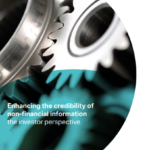Launched today is the worlds first assurance standard developed to ensure the credibility and quality of corporate public reporting on social, environmental and economic performance, as demanded by campaigners and the public, and increasingly investors and regulators.
The AA1000 Assurance Standard is unveiled today at BTs global headquarters to an audience of several hundred senior executives from the business,public and non-governmental sectors. Plenary addresses will include those by Stephen Timms MP, the UK Governments minister responsible for corporate social responsibility, Mervyn Pedelty, CEO of Co-operative Financial Services, and Ernst Ligteringen, CEO of the Global Reporting Initiative.
The Standard will help address a growing crisis of confidence in business and organisations as highlighted in research like the recent MORI poll which concluded that 73 percent of the British public does not believe that business acts socially responsibly. Another poll recently conducted across 46 countries for the World Economic Forum found public trust in the corporate community fell well below that of other distrusted institutions, such as the World Trade Organisation and the International Monetary Fund.
The AA1000 Assurance Standard will play an important part in re-establishing trust around corporate reporting and bridging the divide between business and communities, says Stephen Timms MP, the UK Government s minister responsible for corporate social responsibility.
Giving a business perspective, Mervyn Pedelty, chief executive of Co-operative Financial Services, says: I wish to endorse todays launch of the AA1000 Assurance Standard.
The new standard has been developed by AccountAbility, the London-based international institute established to promote organisational accountability for sustainable development. It is the result of an extensive, two-year, worldwide consultation involving hundreds of organisations from the professions, the investment community, NGOs, labour and business.
The AA1000 Assurance Standard could become the gold standard for an information economy struggling to deal with issues of sustainable development, says Ed Mayo, director of the New Economics Foundation.
The Standard has already been piloted by some of the worlds leaders in sustainability reporting and practice, including Danish pharmaceutical company, Novo Nordisk, the UK lottery provider, Camelot, and the Co-operative Bank and CIS in the UK, and is been used by leading assurance providers, including KPMG, PriceWaterhouseCoopers and Bureau Veritas.
The AA1000 Assurance Standard provides an antidote for the growing crisis of confidence in business. Reports about social and environmental performance lack credibility without a genuine assurance dimension, says Tom Delfgaauw, AccountAbility Chair, and former vice president of sustainable development for Shell International. The development of the AA1000 Assurance Standard is very important in moving towards greater understanding of the reliability and therefore the value of reported information, which is crucial for the investment community. The outputs of this process are already being used in PWCs assurance work, says Geoff Lane a partner at PricewaterhouseCoopers. The AA1000 Assurance Standard is openly-accessible and non-commercial, designed to make certain that corporate claims are rigorously assessed. It will also help to satisfy growing demands from investors and regulators for disclosure of robust, relevant information spelling out the links between business performance and social and environmental impacts.
Rob Lake, Henderson Global Investors head of socially responsible investment engagement and corporate governance, says: The AA1000 Assurance Standard will help build trust on the part of investors and others that company disclosure in these areas is robust.
The Standard also places new demands on consultants and accountants providing external audit and verification. It requires them to demonstrate both independence and impartiality by publicly disclosing commercial relationships with their clients, and their competencies in examining complex issues like human rights, labour standards and climate change.
The AA1000 Assurance Standard is important because it is probably the first time that an assurance standard designed to add credibility to a general purpose report – in this case a sustainability report – has been developed in a truly multi-stakeholder context, says Roger Adams, head of technical services at the Association of Certified Chartered Accountants.



